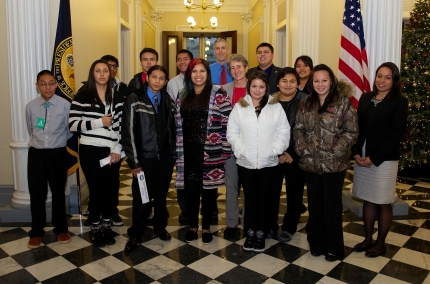Student Voices Session: Shining a Spotlight on Native Youth in Foster Care
Ed. note: This is cross-posted on the U.S. Department of Education's blog. See the original post here.
Youth from every ethnicity and population group experience challenges. American Indian and Alaska Native youth in the foster care system often also must contend with a disconnection from their tribal communities and cultures.
On Dec. 8th, I attended a Student Voices session at the White House hosted by the Department of Education (ED) and Department of Interior. During this time, I witnessed the Obama Administration turn a corner on an issue that is too often invisible to the general public and politicians — understanding the plight of Native youth in foster care.
Fifteen current and former foster care youth representing American Indian and Alaska Native nations from across the United States sat down with Secretaries Arne Duncan and Sally Jewell at the event to discuss the unique struggles that Native youth face.
They all courageously shared stories of survival before entering foster care and of a heartbreaking desire to remain connected to their tribes when placed in foster homes far from their tribal communities. For me, their stories and my own share a key message — take us away from our homes and our culture, and you take us away from our identity and our drive to achieve.
After the meeting, Secretary Duncan asked how ED could help improve academic achievement and the well-being of Native youth in the foster care system.
With 566 federally recognized tribes — each with its own history, language and customs — no one curriculum plan or program can adequately provide the needed emotional, cultural and academic support for all Native youth. Fortunately, numerous tribes and tribal organizations desire a chance to partner with the government to improve the situation. My hope is that new tribal partnerships – specifically for American Indian and Alaska native foster youth – could make schools a safe and trusted alternative to the turmoil these students often encounter outside the school environment.
For me, school was my only haven, allowing me a few hours each day to forget the abuse and neglect I suffered in my most formative years. But, unfortunately, my educational experience is not the norm. My teachers did not address my behavioral problems, frequent absences from school, and lack of foundational skills, such as phonics, because I was always the brightest student in class. I also had thick skin to the racism I experienced in public school. Being Native Hawaiian, as well as American Indian, enabled me to attend Kamehameha Schools, a K-12 boarding-and-day institution that immerses students in Native Hawaiian culture. Kamehameha became my advocate, protector and family. Eventually, my school counselor became my foster mother.
I know firsthand that educational institutions can be not only a source of academic and emotional support for all students with unfortunate circumstances at home, but also a place of cultural opportunity for American Indian and Alaska Native youth disconnected from their tribal communities. So, I am happy to say that my time at the White House and with Secretaries Duncan and Jewell has shown me that the Administration is searching for new ways to improve the lives of Native foster youth. And, more personally, it showed me that people do care about what happens to the invisible.
Seanna Pieper-Jordan is a former foster care youth of Native Hawaiian and American Indian (Blackfeet) descent. She graduated from Yale University with a Bachelors of Arts degree in Sociology in 2013 and Kamehameha High School with honors in 2008. She currently works as a public policy specialist in Washington, D.C.
White House Blogs
- The White House Blog
- Middle Class Task Force
- Council of Economic Advisers
- Council on Environmental Quality
- Council on Women and Girls
- Office of Intergovernmental Affairs
- Office of Management and Budget
- Office of Public Engagement
- Office of Science & Tech Policy
- Office of Urban Affairs
- Open Government
- Faith and Neighborhood Partnerships
- Social Innovation and Civic Participation
- US Trade Representative
- Office National Drug Control Policy
categories
- AIDS Policy
- Alaska
- Blueprint for an America Built to Last
- Budget
- Civil Rights
- Defense
- Disabilities
- Economy
- Education
- Energy and Environment
- Equal Pay
- Ethics
- Faith Based
- Fiscal Responsibility
- Foreign Policy
- Grab Bag
- Health Care
- Homeland Security
- Immigration
- Innovation Fellows
- Inside the White House
- Middle Class Security
- Open Government
- Poverty
- Rural
- Seniors and Social Security
- Service
- Social Innovation
- State of the Union
- Taxes
- Technology
- Urban Policy
- Veterans
- Violence Prevention
- White House Internships
- Women
- Working Families
- Additional Issues


